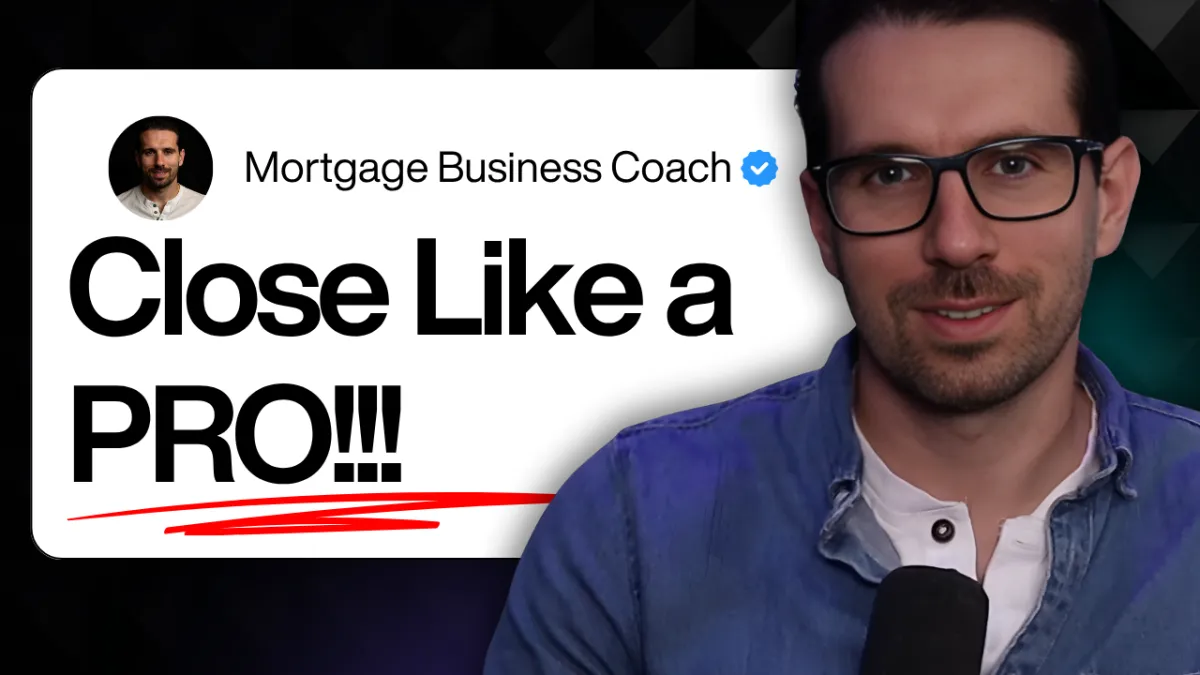
How Can Mortgage Brokers Close More Deals
Closing mortgage deals consistently isn’t about being pushy or slick. It’s about structure, psychology, and clarity. Whether you're a brand-new adviser or a seasoned broker wanting to increase your conversion rate, there are key habits and strategies you must adopt if you want to thrive in today’s competitive market.
Based on coaching hundreds of mortgage brokers, here are five proven ways to close more mortgage deals, all structured for search and filled with practical advice you can implement today.
Why Is a Structured Discovery Call So Important?
The discovery call is the foundation of any successful mortgage sales process.
Too many brokers still treat this stage like a quick fact find — a rushed 15-minute chat to collect income, deposit, and credit score info. That’s not enough.
If you want to consistently close more deals, your discovery call must be structured, strategic, and at least 45 minutes long.
In the Mortgage Business Mastery System, I coach brokers to run a four-phase discovery call:
Set the agenda and intention
Build rapport and ask purposeful questions
Interrogate the hard facts
Introduce the protection pitch
People don’t buy from advisers they barely know. They buy from people they like and trust. If your first conversation is rushed or lacks structure, you're not just losing deals, you're losing trust. Every top-performing broker I’ve worked with starts their process with a proper discovery call.
How Can You Use Price Anchoring to Make Fees and Protection More Palatable?
Price anchoring is a psychological sales tactic that makes your offering feel reasonable by setting expectations early.
Mortgage brokers often struggle to charge fees or get protection accepted because they fail to anchor the conversation.
Let’s take protection, for example.
Instead of saying “This life insurance is £50 a month,” anchor the cost first:
"Most of my clients spend around 5% of their net income on financial protection. That usually works out around £100 to £150 per month, depending on family size and needs."
Now, when you present a £50 to £80 policy, it feels reasonable in comparison.
The same applies to your mortgage fee. Rather than comparing it to a valuation or something trivial, anchor it against a larger figure like stamp duty or legal fees.
Set expectations early by saying:
"Here’s what the process will look like. You’ll pay a £495 fee once we’ve secured your agreement in principle."
This positions you as a professional, not a broker bartering on price.
What’s the Real Goal of Your Mortgage Appointment?
Most brokers think the goal is to save the client money or offer better rates.
That’s a mistake.
Your real goal is to make yourself the obvious choice.
You want your client to walk away thinking:
"It’s either this broker or no one."
That means they remember you, not your rates.
A great way to do this is by shifting the odds in your favour. Instead of being one of five brokers the client is speaking to, all offering similar products, aim to be the only adviser they emotionally connect with.
The key is to be memorable.
If you’re forgettable, you lose. If you stand out, you win.
Don't worry about being liked by everyone. Your job is to create an emotional reaction: trust, certainty, confidence. If you can do that, the choice isn’t between five brokers. It’s "Do I work with you or not at all?"
How Do You Pre-Handle Objections to Increase Trust and Close Rates?
Objections kill conversions, but only if they catch you off guard.
The secret is to pre-handle them before they ever come up.
Most common objections around fees, protection, or timing can be handled early in the conversation. For example:
"You might be wondering: do I really need insurance? Most of my clients feel one of three things. They think it’s too expensive, they feel young and healthy, or they’ve had a bad past experience. Which one sounds most like you?"
This brings the objection to the surface and creates safety. The client knows they’re not alone.
When you surface objections yourself, clients stop resisting and start listening.
You remove the power of resistance and instead build trust through transparency. Pre-handling objections positions you as confident and in control.
Why Does Ending With a Clear Path Increase Conversions?
Clarity closes.
At the end of any call or appointment, you must give clients one clear next step.
Not five things. Not vague timelines. One clear instruction.
Examples:
"Once we get the documents back, we’ll move to agreement in principle."
"Your next step is to complete the budget planner I’ve just emailed."
"We’ll speak again Thursday at 2pm to review your protection package."
Unclear next steps lead to hesitation, ghosting, and slow deals.
The moment your client feels unsure, they drift. And drifting clients become lost clients.
Be crystal clear. Be confident. Make it easy for them to say yes.
How Can Mortgage Brokers Improve Their Closing Rate Today?
If you want to close more mortgage deals without chasing or discounting, implement these five shifts immediately:
Structure your discovery call and make it 60 minutes with clear phases
Use price anchoring to make your offers feel like value
Become unforgettable and be the adviser they remember
Pre-handle objections before they ever come up
End every call with one clear, agreed action
These strategies are not theory. They are battle-tested with hundreds of mortgage brokers I’ve coached.
If you're tired of inconsistent conversions and want to become the adviser clients trust, remember this: confidence comes from structure.
Want More Help Closing Mortgage Leads?
Watch my full video breakdown on how to close more mortgage clients
Or check out my Mortgage Sales Mastery training where we dive into sales psychology, discovery scripts, objection handling and more.
